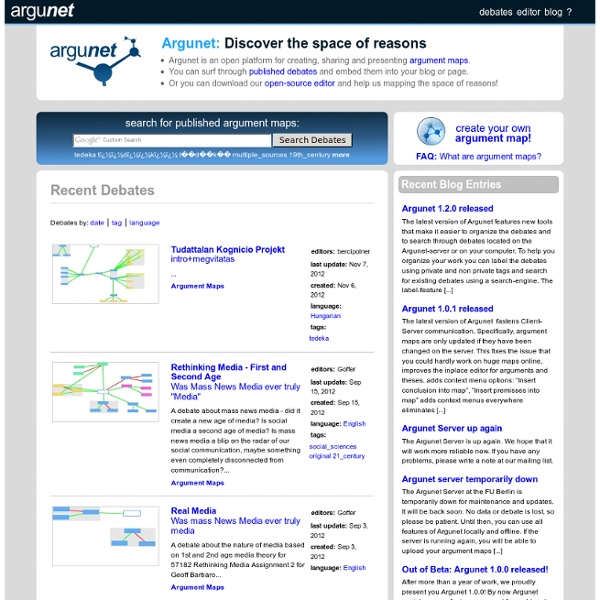



Argument map Visual representation of the structure of an argument Argument maps are commonly used in the context of teaching and applying critical thinking.[2] The purpose of mapping is to uncover the logical structure of arguments, identify unstated assumptions, evaluate the support an argument offers for a conclusion, and aid understanding of debates. Argument maps are often designed to support deliberation of issues, ideas and arguments in wicked problems.[3] A number of different kinds of argument maps have been proposed but the most common, which Chris Reed and Glenn Rowe called the standard diagram,[5] consists of a tree structure with each of the reasons leading to the conclusion. There is no consensus as to whether the conclusion should be at the top of the tree with the reasons leading up to it or whether it should be at the bottom with the reasons leading down to it.[5] Another variation diagrams an argument from left to right.[6] According to Douglas N. [edit] Diagramming written text
Mindmapping, concept mapping in 3D Press Space or double-click to edit Capture ideas at the speed of thought – using a mind map maker designed to help you focus on your ideas and remove all the distractions while mindmapping. Create unlimited mind maps for free, and store them in the cloud. Your mind maps are available everywhere, instantly, from any device. Brainstorm, create presentations and document outlines with mind maps, and publish your ideas online and to social networks. Get Started Why use MindMup? MindMup is great for individual note-taking, collaborative planning, teamwork and classrooms. 1 Powerful keyboard shortcuts speed up your work 2 Frictionless interface helps you focus 3 Convert maps easily to PDF, PowerPoint, outlines... 4 Publish and share maps online 5 Easily save to Google Drive and manage using Google Apps
Free mind mapping (and related types) software I see regular inquiries on Twitter and in forums from people looking for free software to support visual thinking. To provide answers, InformationTamers have put together 14 pages to help you find the one for your needs. These show the platform, a screen thumbnail and a link for more information in each case. Mind-mapping.org has a good capability for selecting software by map type and operating system (click on the ‘Refine software list’ tab at the top right of its web page). “Free” here is as in beer, not in freedom, though some of the software listed is open source, so is free in both senses. Of course a pencil and paper is always almost free. This used to be one long page, but as I updated and added to it, it became unmanageable, so now it’s broken down by category. Click through for more details:
15 common mind map elements Jul 3rd, 2012 | By Chuck Frey | Category: Resources If you’re new to the world of mind mapping software, you may not realize all of the types of content you can include in a software-produced visual map. So I created a mind map to summarize what’s possible. Please click on the image above to load a much larger version of this map, with branches expanded to explain what each type of mind map content is, and how you can use it. I hope you find this to be useful to you! If you have anything to add, please do so in the comments area. (Mind map created using NovaMind 5 for Windows) Tags: boundary, excel, hypertext link, icon, image, link, mind map, mindmap, task management, topic note
prefuse | interactive information visualization toolkit Visual Thinking Evolution A mind map is a diagram used to represent words, ideas, tasks, or other items linked to and arranged around a central key word or idea. Especially in British English, the terms spidergram and spidergraph are more common,[1] but they can cause confusion with the term spider diagram used in mathematics and logic. Mind maps are used to generate, visualize, structure, and classify ideas, and as an aid to studying and organizing information, solving problems, making decisions, and writing. The elements of a given mind map are arranged intuitively according to the importance of the concepts, and are classified into groupings, branches, or areas, with the goal of representing semantic or other connections between portions of information. By presenting ideas in a radial, graphical, non-linear manner, mind maps encourage a brainstorming approach to planning and organizational tasks. The mind map can be contrasted with the similar idea of concept mapping. Reference: wikipedia
Mind42.com - Collaborative mind mapping in your browser Official Mind Mapping software by Tony Buzan Mind Mapping Software – Productivity, Planning, Learning, Communication List of concept- and mind-mapping software From Wikipedia, the free encyclopedia Concept mapping and mind mapping software is used to create diagrams of relationships between concepts, ideas, or other pieces of information. It has been suggested that the mind mapping technique can improve learning and study efficiency up to 15% over conventional note-taking.[1] Many software packages and websites allow creating or otherwise supporting mind maps. File format[edit] Using a standard file format allows interchange of files between various programs. Free and open-source[edit] The following tools comply with the Free Software Foundation's (FSF) definition of free software. Freeware[edit] The following is a list of notable concept mapping and mind mapping applications which are freeware and available at no cost. Proprietary software[edit] The table below lists pieces of proprietary commercial software that allow creating mind and concept maps. See also[edit] References[edit]
MindRaider - Personal Notebook and Outliner